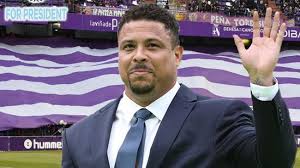May 27 – Real Valladolid’s volatile ownership era under Brazilian football legend Ronaldo Nazário has come to an end following the sale of his majority stake to a North American investment group, the club confirmed late Friday. The deal concludes a six-year tenure that promised commercial transformation but ultimately delivered sporting instability, fan unrest, and diminishing returns both on and off the pitch.
Ronaldo, who acquired 51% of the Spanish club in 2018 for approximately €30 million, had aimed to reposition Valladolid as a sustainable LaLiga mainstay, leveraging his global profile to attract commercial interest and professionalise operations. While the club enjoyed occasional flashes of progress, including brief returns to Spain’s top flight, the overarching narrative has been one of relegation cycles, managerial churn, and fractured local engagement.
The sale comes just 24 hours before Valladolid closed out one of its worst campaigns in recent memory, finishing bottom of LaLiga after a 3-0 defeat to Leganés — their 29th loss of the season. This third relegation under Ronaldo’s watch follows similar demotions in 2021 and 2023, highlighting the club’s struggle to maintain top-tier status despite the visibility and ambition associated with his arrival.
Absent from key matches
From a business perspective, Ronaldo’s ownership was a mixed experiment. While he succeeded in raising the club’s international profile and introduced structural changes to backroom operations, local sentiment quickly soured as the footballing returns dwindled. Notably absent from key matches this season — attending just three Valladolid fixtures — Ronaldo faced mounting criticism for his perceived detachment, culminating in fan protests and vocal calls for a change in leadership.
The decision to sell, while long-anticipated, was met with cautious optimism. The incoming investors — yet to be publicly named — represent a growing trend of North American capital entering European football, where undervalued or distressed assets are being repositioned for long-term upside. The financial terms of the transaction have not been disclosed, but it is understood Ronaldo initially sought around €40 million for his share.
The move mirrors Ronaldo’s earlier divestment from Brazilian club Cruzeiro in 2023, another ownership spell marked by high expectations and mixed results. His exits from both teams suggest a re-evaluation of his role in club ownership at a time when institutional investors are increasingly seeking more data-driven, performance-linked returns.
For Real Valladolid, the transition opens the door to a much-needed reset. The challenge for the new owners will be twofold: first, to rebuild trust with a disillusioned fanbase and regional stakeholders; and second, to develop a coherent strategy for sporting recovery and financial sustainability. Whether the club can capitalise on its brand visibility and proximity to LaLiga’s commercial structure will now depend less on Ronaldo’s stardust and more on the new backers’ execution.
Contact the writer of this story, Harry Ewing, at moc.l1750223706labto1750223706ofdlr1750223706owedi1750223706sni@g1750223706niwe.1750223706yrrah1750223706

